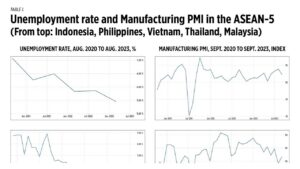Do tobacco taxes cause illicit trade?

On Oct. 12, media outlets publicized the launch of a study by the University of Asia and the Pacific (UA&P) and the Federation of Philippine Industries (FPI), which claimed that “there is a direct correlation in the imposition of higher taxes on cigarettes to smuggling.” The group behind the study noted that “we cannot impose new taxes on the cigarette industry because it only hurts the industry itself as well as consumers.” This is a misguided and reductive argument.
First, basic statistics tells us that correlation does not imply causation. It is crucial to establish whether the higher tax rates actually caused an increase in smuggling or illicit trade.
Higher taxes are not the only factor that may lead to an increase in illicit trade. Global evidence shows that illicit trade is more of a function of poor tax administration rather than tobacco tax rate increases. Illicit trade can thus be neutralized by good governance and good institutions.
A 2019 study by Nguyen and Nguyen found that in Vietnam, the volume of illicit cigarettes has decreased over time, even as tobacco taxes increased, suggesting that cigarette prices are not a key determinant of illicit trade. According to the World Bank, the “overall level of smuggling is generally higher in countries that have lower cigarette prices (generally also countries with a lower tax rate) than in countries that have high prices.”1
Examining the Philippine context, we can refer to Monica Lavares, Ariza Francisco, Hana Ross, and Nadia Doytch’s 2020 study published by the Ateneo School of Government, which, using a gap analysis, concluded that: “In spite of the large tax increases by the Philippine government through the Sin Tax Law starting from 2013 until 2018, the illicit share in 2018 remains similar to its 1998 level of 16% of the total market. Hence, our study finds no evidence of a positive relationship between tobacco taxes and size of illicit cigarette market in the Philippines.”
Smuggling can occur even if prices are low. A prime example is the rampant smuggling of rice and other agricultural commodities even if tariffs on these products have been decreasing. If a smuggler believes they have a high probability of smuggling without getting caught, the likelihood is they will continue to smuggle.
The issue of illicit trade and smuggling has perennially been brought up by the tobacco industry to argue against raising tobacco taxes. But the idea of doing away with tobacco taxes because of illicit trade is dangerous. The benefits of tobacco taxes are monumental not only for revenue, as evidenced by the tripling of our Health budget since 2012, but also for public health. Tobacco tax reforms contributed to the sharp decline in smoking prevalence, in spite of illicit trade. Consumer surveys (the Global Adult Tobacco Survey and the National Nutrition Survey of the Department of Science and Technology’s Food and Nutrition Research Institute) measuring smoking prevalence include both licit and illicit cigarettes, and the 2021 GATS shows that smoking prevalence has been cut by a third since 2009. The NNS shows us that tobacco taxes cut consumption mainly by preventing first-time smokers from starting the addictive habit.
Health advocates are also keen on addressing illicit tobacco trade because it undermines the health and revenue gains of tobacco taxes. We must prevent the availability of cheap and unregulated cigarettes to the vulnerable and price-sensitive youth and poor. Thus, the UA&P paper’s call for stronger enforcement is one that is echoed by civil society.
However, to quote Myrna Austria and Alyssa Villanueva’s 2021 paper on illicit cigarette trade in the Philippines published by the De La Salle University School of Economics: “The increase in illicit cigarette trade should not be an excuse not to increase the excise tax on cigarettes. Instead, the ongoing tax policy reforms should be taken as part of a comprehensive program to lower cigarette consumption in the country.” The World Bank has also noted that “the strengthening of tax administration and tobacco tax reform should be viewed as complementary.”2
Tobacco products are price inelastic, therefore the increase in taxes will still result in earning net revenues. In fact, the Department of Finance’s estimation of optimal tax rates was P75 in 2018, which is still higher than the current rate of P60. Based on history, performance, and the economic concept of price elasticity, there is still room to increase tobacco taxes in the near future, especially if coupled with stronger tax administration efforts.
It is also crucial to note that the UA&P study “Illicit Cigarette Trade in the Philippines: Economic and Social Impacts of Weak Regulatory Enforcement” was commissioned by FPI. A quick Google search will show that Japan Tobacco International (JTI) has posted FPI’s positions on illicit trade policy in the Philippines on its website on several occasions. This link suggests a possible conflict of interest.
Further, although the study was publicly launched through an event with the media, it has yet to be made available to the public in its full form and its methodology lacks transparency. Civil society has requested access to the paper but has not received a copy as of this writing.
That the tobacco industry does research on illicit trade is nothing new, but our journalists should be more discerning and probe deeper into methodology and possible conflicts of interest when writing about illicit tobacco trade studies.
We must resist the industry’s use of illicit trade as an argument to erode the gains of sin taxes. If the tobacco industry wants to protect revenues, diluting tobacco tax reforms is not the solution.
The way forward is to enact reforms to curb illicit trade while simultaneously defending tobacco taxes. The insertion of tobacco in the Anti-Agricultural Smuggling Bill, which raises penalties for large-scale smuggling, hoarding, profiteering, and cartelizing, and was supported by the tobacco industry, is insufficient in countering illicit tobacco trade.
Representative Joey Salceda, Chairman of the Ways and Means Committee in the House, announced in an Oct. 17 press conference held by the Sin Tax Coalition that he will propose a separate bill on the illicit trade of tobacco, with key provisions such as a tracking and tracing system and stricter regulation for online marketplaces. The Bureau of Internal Revenue (BIR), for its part, has also committed to strengthening its tax stamp system and turning it into a tracking and tracing system to counter illicit tobacco trade. These efforts are commendable, and hopefully will lead to recouping revenues and even lower tobacco consumption, especially among the vulnerable poor and the youth.
Pia Rodrigo heads the health policy team of Action for Economic Reforms.




